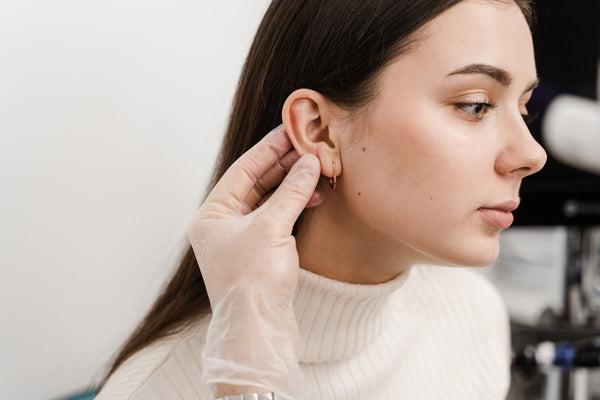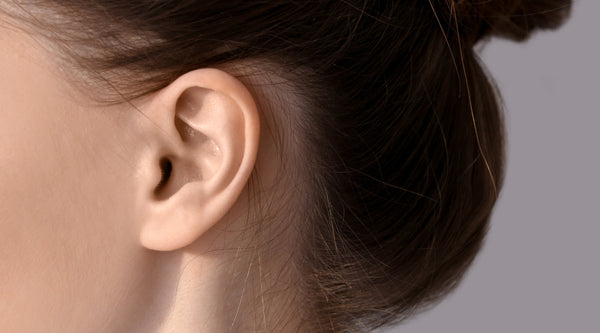Understanding otitis media: causes, symptoms & treatment
Otitis media is a middle ear infection that causes inflammation and fluid build-up behind the eardrum. It’s a common condition that can affect both children and adults, often developing after a cold, sinus infection, or allergy. While it can cause discomfort or temporary hearing loss, most cases clear up with time and the right care.
At Leightons, we understand how worrying ear pain or hearing changes can be. Our experienced audiologists can assess your ear health, explain what’s happening, and guide you to the right support to keep your hearing healthy.
What is otitis media?
Otitis media refers to an infection or inflammation of the middle ear - the small space behind your eardrum that contains tiny bones responsible for hearing. This area is connected to the back of your throat by a narrow passage called the Eustachian tube, which helps equalise pressure and drain fluid from the ear.
When the Eustachian tube becomes blocked or swollen, fluid can build up in the middle ear. This trapped fluid can become infected by bacteria or viruses, leading to pain, pressure, and sometimes hearing loss.
Otitis media is especially common in children because their Eustachian tubes are shorter and more horizontal, making it easier for infections to develop.
What causes otitis media?
Several factors can contribute to the development of a middle ear infection, including:
Viral or bacterial infections, often following colds or flu
Eustachian tube dysfunction, which prevents proper drainage
Allergies or sinus congestion
Adenoid enlargement in children, which can block the Eustachian tube
Smoke exposure, which can irritate the ear and throat
These issues can trap fluid behind the eardrum, creating an ideal environment for infection.
Common symptoms of otitis media
Symptoms of otitis media can vary depending on age and severity but may include:
Ear pain or a feeling of fullness
Hearing loss or muffled hearing
Fluid discharge from the ear (if the eardrum ruptures)
Fever or feeling generally unwell
Irritability or trouble sleeping (especially in children)
Balance problems or dizziness in some cases
In children, signs may also include tugging at the ear or difficulty responding to quiet sounds. If symptoms persist beyond a few days, it’s best to seek professional advice.
Types of otitis media
There are a few different types of otitis media, depending on how long the infection lasts and whether fluid remains trapped in the ear:
Acute Otitis Media (AOM): A short-term infection that causes ear pain, redness, and sometimes fever.
Otitis Media with Effusion (OME): Also known as glue ear, this is when fluid remains in the middle ear after infection but without active symptoms.
Chronic Otitis Media: Ongoing or repeated infections that can lead to longer-term hearing issues or ear discharge.
How is otitis media diagnosed and treated?
A GP or ENT specialist will usually diagnose otitis media by looking inside the ear with an otoscope and checking for signs of redness, swelling, or fluid.
Treatment depends on the cause and severity of the infection:
Pain relief such as paracetamol or ibuprofen can help manage discomfort.
Antibiotics may be prescribed if the infection is bacterial or persistent.
Nasal sprays or decongestants can help relieve pressure and aid drainage.
In recurring cases, grommet surgery (tiny tubes placed in the eardrum) may be recommended to help fluid drain and prevent further infections.
Most infections clear up within a week or two. However, follow-up hearing checks can ensure that any fluid or hearing changes have resolved fully.
Preventing otitis media
While not all ear infections can be avoided, you can reduce your risk by:
Treating colds and allergies promptly
Avoiding exposure to cigarette smoke
Keeping ears clean and dry (without inserting objects like cotton buds)
Managing sinus issues or congestion early
Booking regular hearing assessments to identify recurring ear problems early
How Leightons can help
At Leightons, our audiologists provide ear health checks and free hearing assessments to identify signs of infection, fluid build-up, or hearing loss. If otitis media is suspected, we can:
Explain your results clearly and refer you to your GP or ENT specialist if needed
Provide follow-up hearing tests after recovery
Offer advice on keeping your ears healthy and preventing future infections
We’re here to help you and your family protect your hearing, stay comfortable, and feel confident in your ear health.
Book your free hearing assessment today and take the first step towards clearer, healthier hearing.
Learn more









